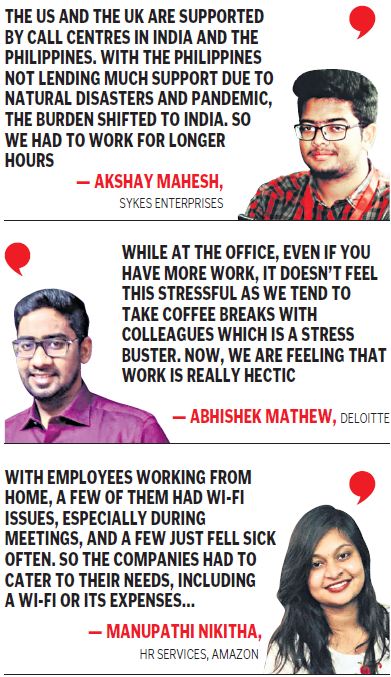‘Work From Home’ euphoria fading away
From a blessing just a few months ago to a bane now, work from home — though has some advantages — testing techies’ patience

Hyderabad: There was a time when taking a break and staying home was a luxury for most techies. But that was before the pandemic, before that video of a working mother struggling to keep her calm during an official call even while scolding her mischievous kids went viral.
Now, the concept of working remotely is redrawing every known boundary and giving new meanings to work-life balance as a majority of software firms continue to stick to work from home (WFH) modes.
The initial euphoria, of being able to stay at home and safe from the virus, is slowly fading. Long working hours are bleeding into personal lives due to increased requirements from companies.
“Initially, the pandemic seemed like a blessing as we could work from the comforts of our home. But with time, staying glued to a chair with the four walls of your own room became stressful. Lethargy, increasing body weight as we keep munching while working with no physical exercise also added to the stress,” he says, adding that many have to attend to mails and calls at odd hours too.
And then, the ambience. The small talk with colleagues, the tea break in between, the short walk to have a snack or smoke, the jokes at the team leader and journey to the office all are now recurring as flashes of a long gone past.
“While at the office, even if you have more work, it doesn’t feel this stressful as we tend to take coffee breaks with colleagues which is a diversion or stress buster. Now, we are feeling that work is really hectic,” says Abhishek Mathew, 30, who works for Deloitte.
Virtual camaraderie
A little laughter at the workplace is good. With WFH changing circumstances, several companies have tried to fill the vacuum of personal interactions with interactive virtual activities among team members.
“We play virtual tambola and trivia, have healthy competitions like cooking, music, a quick chair yoga session and so on to relax. We used to have these activities every week in the beginning but due to the workload, we have them only once in a month now,” says Akshay Mahesh.
Apart from these activities, several companies have also sponsored a ‘home office’. “With employees working from home, a few of them had Wi-Fi issues, especially during meetings, and a few just fell sick often. So the companies had to cater to their needs, including a Wi-Fi or its expenses, a laptop or desktop with a UPS or any external power support and tables and chairs for comfortable working,” says Manupathi Nikitha, 24, senior associate, HR services at Amazon.
Many companies are also regularly monitoring the well being of employees, with some doing this through questionnaires, video calls with counsellors, or interactions with the team leader.
Family time
The WFH system might have its drawbacks, but for many who hitherto spent years slogging in offices away from home, it has meant family time.
“The biggest positive is that we eliminate a daily travel time of at least three to four hours. The pressure of traffic and travelling itself drains our energy after a long day at the office. Hence, we could not spend time with the family. Now, the time spent in travelling is spent with the family,” says Mahendher Reddy, 41, vice-president, Cloud4C Services.
There is another side to it as well.
“I was excited at the prospect of WFH as it had only been a few months since my wedding and I saw this as a chance to spend quality time with my new family. But WFH came with its own set of problems like failing internet connectivity at crucial times, office stress spilling over in home environment and work becoming more hectic with added home responsibilities. The WFH fatigue is as real as it gets, and I am wishing for the office to start operating again to get back my work-home balance,” says Rajeshwari Maryala.
The positive side

 Even as the pandemic is still raging on, the IT industry in the city is witnessing growth, with several companies opening doors to welcome new recruits to cater to the increased workload.
Even as the pandemic is still raging on, the IT industry in the city is witnessing growth, with several companies opening doors to welcome new recruits to cater to the increased workload.
The difference is that hands-on training has acquired a new meaning with new hands being trained virtually.
“I have received a desktop computer from the company and am being virtually trained through their own training applications. We have an online test after every module and then a virtual training from the respective heads,” says LJ Revan, 21, who recently joined Amazon.
“The only drawback of virtual training could be the absence of physical interaction and making new friends while on training. But otherwise, I find WFH better as I can have lunch with my family which we usually don’t get to do. Also, as my shift gets over at 6, I hit the bed much sooner since there is no travel time,” adds Revan.
“WFH has led to reduction of at least some carbon footprint due to a fall in traffic and also to wellbeing of employees since travel time is invested in working on our physical wellbeing,” says Gourav Chawda, 26, a Compliance Analyst at Invesco.
“I think WFH is feasible with a little percentage of employees working from the office depending on their respective profiles. It will translate a lot of wasted time into productivity,” says Gourav.
Now you can get handpicked stories from Telangana Today on Telegram everyday. Click the link to subscribe.
Click to follow Telangana Today Facebook page and Twitter .
Related News
-
Khammam police arrests four involved in YouTuber Boggula Srinivas murder
9 mins ago -
Samantha Ruth Pabhu’s ‘Maa Inti Bangaaram’ to release on May 15, 2026
20 mins ago -
Two JeM terrorists killed in Kishtwar encounter
54 mins ago -
Shalini Pandey calls leaving home the “best decision” of her life
1 hour ago -
Indian Union Muslim League hits out at SFI’s beef fest over Kerala Story 2
1 hour ago -
Khushi Kapoor’s ‘February’ was a mix of cupcakes, hotness & Orry
2 hours ago -
Market cap of six top-10 firms jump Rs 63,478 crore
2 hours ago -
Odisha: 5 police personnel killed, 4 others injured in SUV-truck collision
2 hours ago




